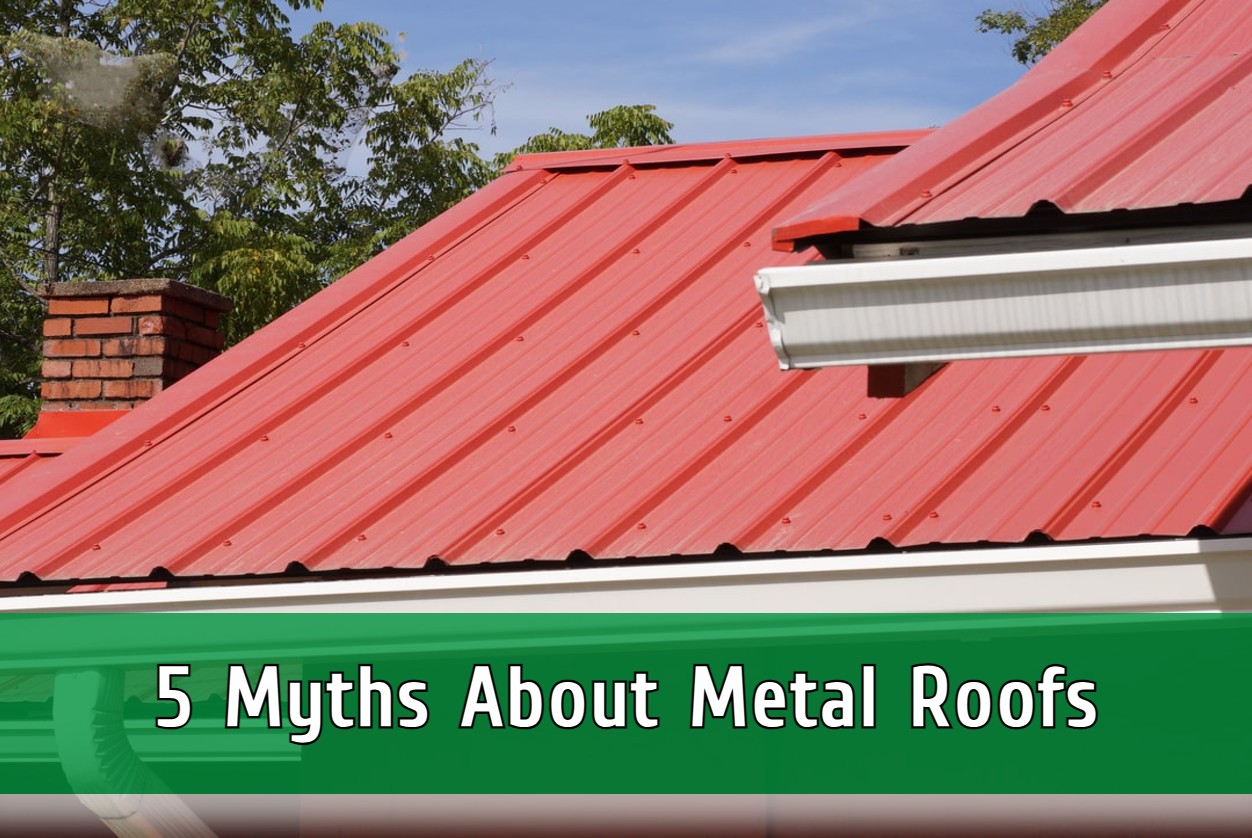When it comes to residential roofing systems, metal roofs are often surrounded by a variety of misconceptions. These false beliefs can keep homeowners from considering metal roofs as a quality roofing option. The prevalence of these myths makes it essential to separate fact from fiction.
By debunking roofing myths, we can provide clearer insights into the pros and cons of metal roofs, highlight their durability, and showcase the benefits of residential metal roofs. This article aims to address common metal roofing misconceptions and provide factual information to help you make informed decisions about your roofing needs.
Myth 1: Metal Roofs are Noisy
One common metal roof myth is that they are excessively noisy, especially during rainstorms or hail. However, this is not necessarily true. When comparing noise levels, metal roofs are often just as quiet as other roofing materials like asphalt shingles. This is because metal roofs are typically installed with quality underlayment and insulation which help to dampen the sound.
There are also specific techniques to reduce noise in metal roofs. Adding more insulation underneath the metal panels can significantly minimize any potential noise. Additionally, using thicker materials for the roof or opting for textured, rather than smooth finishes can further reduce sound levels. These methods ensure that metal roofs are not only durable, but also quiet, debunking the metal roofing misconception that they are noisy.
Myth 2: Metal Roofs are Prone to Rust
Another common metal roof myth is that they are highly susceptible to rust. Thanks to modern advancements in metal roofing materials, this is no longer a significant concern. Today’s metal roofs are crafted from high-quality materials designed to resist corrosion and rusting. For instance, many metal roofs are made from galvanized steel, which includes a protective zinc coating that prevents rust.
In addition to the use of rust-resistant metals, protective coatings play a crucial role in enhancing the durability of metal roofs. These coatings, often made from specialized paints and sealants, provide an extra layer of protection against the elements. They are designed to withstand harsh weather conditions, ensuring that the roof remains rust-free for many years. By investing in these advanced materials and coatings, homeowners can enjoy the longevity and reliability of metal roofs without worrying about rust, debunking another of the prevalent metal roofing misconceptions.
Myth 3: Metal Roofs are Easily Damaged by Hail
Many people believe that metal roofs can be easily damaged by hail. This belief is not accurate. Metal roofs are known for their durability and are designed to withstand extreme weather conditions, including hailstorms. The materials used in metal roofing, such as steel and aluminum, are strong and resilient, providing excellent protection against impacts.
In fact, many metal roofs are tested and rated for their resistance to hail damage. These ratings are based on standardized tests that simulate the effects of hailstones of varying sizes. Real-world examples and case studies have shown that metal roofs often fare better in hailstorms compared to other roofing materials like asphalt shingles, which can crack or lose granules.
For homeowners concerned about hail damage, investing in a metal roof can offer peace of mind. The durability of metal roofs in extreme weather conditions makes them a reliable choice, debunking the myth that they are easily damaged by hail. This reinforces the idea that metal roofs are a robust and long-lasting roofing option, contrary to common myths.
Myth 4: Metal Roofs are Too Expensive
One of the pervasive metal roofing myths is that they are expensive. While the initial cost of a metal roof can be higher than other roofing options, it’s important to consider the long-term cost benefits and savings involved. Metal roofs have a lifespan of 40 to 70 years, significantly longer than traditional asphalt roofs, which typically last 12 to 20 years. This longevity means fewer replacements and repairs over time, saving homeowners money in the long run.
When comparing initial costs, it’s crucial to factor in the overall value. Metal roofs offer superior durability, energy efficiency, and low maintenance, which can lead to additional savings. For example, metal roofs reflect solar heat, reducing cooling costs by up to 25%. Additionally, they require minimal maintenance compared to other roofing materials, which often need frequent repairs and replacements. By weighing both the initial cost and long-term savings, it’s clear that metal roofs are a cost-effective investment, debunking the myth that they are too expensive.
Myth 5: Metal Roofs Attract Lightning
A prevalent metal roofing misconception is that metal roofs attract lightning. This belief is rooted in the idea that metal, being a good conductor of electricity, will more likely be struck by lightning. However, scientific evidence and statistics show that metal roofs do not increase the likelihood of lightning striking your home.
According to the Metal Construction Association, metal roofing does not attract lightning any more than other types of roofing materials. In fact, metal roofs can be safer during thunderstorms because they are non-combustible and can dissipate the energy of a lightning strike more effectively. Additionally, metal roofs are often equipped with safety features such as grounding systems that further enhance their safety during storms.
By understanding the scientific evidence and safety features integrated into metal roofing systems, we can debunk the myth that metal roofs attract lightning. This helps homeowners make informed decisions and dispels common metal roof myths, ensuring that they recognize the safety and reliability of metal roofing options.
Conclusion: The Real Benefits of Metal Roofs
Throughout this article, we’ve addressed and debunked several common metal roof myths. From misconceptions about noise and rust to misunderstandings about hail damage, cost, and lightning attraction, we’ve clarified the facts. Metal roofs are not only durable and quiet but also resistant to rust and hail damage. They’re a cost-effective choice in the long run, despite the initial investment, and they do not attract lightning.
Metal roofing offers numerous advantages, making it an excellent choice for homeowners. Its durability ensures it can withstand harsh weather, while its energy efficiency helps reduce cooling costs. Low maintenance needs and a long lifespan further add to its appeal. By choosing a metal roofing system, you are investing in a reliable, long-term solution that debunks many common metal roofing misconceptions. For those in the Southern Ohio area, consulting with a professional roofing contractor can provide additional insights and help you make the best decision for your property.
Discover the Truth About Metal Roofing Systems With The Team At Elite Roofing
Don’t let misconceptions hold you back from receiving the benefits that come with having a metal roof. Elite Roofing is here to debunk those myths and provide you with reliable, long-lasting solutions for your property. Say goodbye to the metal roofing stereotypes you used to know. Our modern metal roofing materials and protective coatings ensure durability, cost-effectiveness, and safety. Call Elite Roofing at (937) 500-7663 to schedule a consultation and experience the real advantages of metal roofing for yourself.

